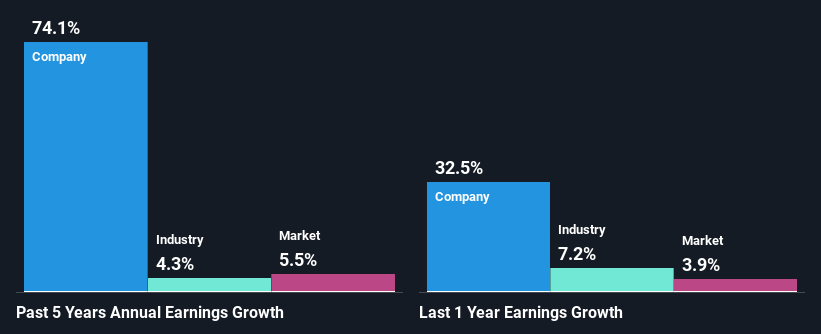- Saudi Arabia
- /
- Wireless Telecom
- /
- SASE:7020
Are Etihad Etisalat Company's (TADAWUL:7020) Fundamentals Good Enough to Warrant Buying Given The Stock's Recent Weakness?

Etihad Etisalat (TADAWUL:7020) has had a rough month with its share price down 5.2%. However, stock prices are usually driven by a company’s financials over the long term, which in this case look pretty respectable. In this article, we decided to focus on Etihad Etisalat's ROE.
Return on equity or ROE is a key measure used to assess how efficiently a company's management is utilizing the company's capital. Simply put, it is used to assess the profitability of a company in relation to its equity capital.
View our latest analysis for Etihad Etisalat
How To Calculate Return On Equity?
Return on equity can be calculated by using the formula:
Return on Equity = Net Profit (from continuing operations) ÷ Shareholders' Equity
So, based on the above formula, the ROE for Etihad Etisalat is:
7.5% = ر.س1.2b ÷ ر.س16b (Based on the trailing twelve months to March 2022).
The 'return' is the profit over the last twelve months. So, this means that for every SAR1 of its shareholder's investments, the company generates a profit of SAR0.07.
What Is The Relationship Between ROE And Earnings Growth?
Thus far, we have learned that ROE measures how efficiently a company is generating its profits. Depending on how much of these profits the company reinvests or "retains", and how effectively it does so, we are then able to assess a company’s earnings growth potential. Assuming all else is equal, companies that have both a higher return on equity and higher profit retention are usually the ones that have a higher growth rate when compared to companies that don't have the same features.
Etihad Etisalat's Earnings Growth And 7.5% ROE
It is hard to argue that Etihad Etisalat's ROE is much good in and of itself. Even when compared to the industry average of 11%, the ROE figure is pretty disappointing. In spite of this, Etihad Etisalat was able to grow its net income considerably, at a rate of 74% in the last five years. We reckon that there could be other factors at play here. For instance, the company has a low payout ratio or is being managed efficiently.
As a next step, we compared Etihad Etisalat's net income growth with the industry, and pleasingly, we found that the growth seen by the company is higher than the average industry growth of 7.5%.

Earnings growth is a huge factor in stock valuation. What investors need to determine next is if the expected earnings growth, or the lack of it, is already built into the share price. Doing so will help them establish if the stock's future looks promising or ominous. Has the market priced in the future outlook for 7020? You can find out in our latest intrinsic value infographic research report.
Is Etihad Etisalat Efficiently Re-investing Its Profits?
The three-year median payout ratio for Etihad Etisalat is 46%, which is moderately low. The company is retaining the remaining 54%. This suggests that its dividend is well covered, and given the high growth we discussed above, it looks like Etihad Etisalat is reinvesting its earnings efficiently.
Additionally, Etihad Etisalat has paid dividends over a period of at least ten years which means that the company is pretty serious about sharing its profits with shareholders. Looking at the current analyst consensus data, we can see that the company's future payout ratio is expected to rise to 67% over the next three years. Regardless, the future ROE for Etihad Etisalat is speculated to rise to 9.2% despite the anticipated increase in the payout ratio. There could probably be other factors that could be driving the future growth in the ROE.
Summary
Overall, we feel that Etihad Etisalat certainly does have some positive factors to consider. Despite its low rate of return, the fact that the company reinvests a very high portion of its profits into its business, no doubt contributed to its high earnings growth. With that said, the latest industry analyst forecasts reveal that the company's earnings growth is expected to slow down. Are these analysts expectations based on the broad expectations for the industry, or on the company's fundamentals? Click here to be taken to our analyst's forecasts page for the company.
Valuation is complex, but we're here to simplify it.
Discover if Etihad Etisalat might be undervalued or overvalued with our detailed analysis, featuring fair value estimates, potential risks, dividends, insider trades, and its financial condition.
Access Free AnalysisHave feedback on this article? Concerned about the content? Get in touch with us directly. Alternatively, email editorial-team (at) simplywallst.com.
This article by Simply Wall St is general in nature. We provide commentary based on historical data and analyst forecasts only using an unbiased methodology and our articles are not intended to be financial advice. It does not constitute a recommendation to buy or sell any stock, and does not take account of your objectives, or your financial situation. We aim to bring you long-term focused analysis driven by fundamental data. Note that our analysis may not factor in the latest price-sensitive company announcements or qualitative material. Simply Wall St has no position in any stocks mentioned.
About SASE:7020
Etihad Etisalat
Through its subsidiaries, establishes and operates mobile wireless telecommunication and fiber optic networks in the Kingdom of Saudi Arabia.
Undervalued with excellent balance sheet.
Similar Companies
Market Insights
Community Narratives




